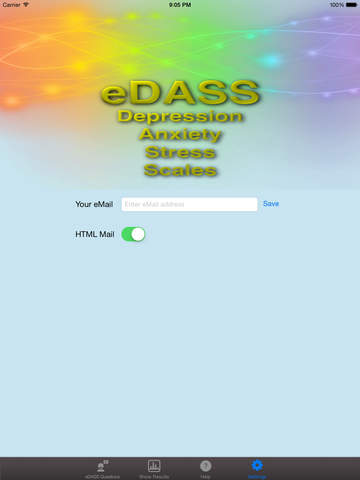
eDASS app for iPhone and iPad
General description of the scales
The DASS is a set of three self-report scales designed to measure the negative emotional states of depression, anxiety and stress. The DASS was constructed not merely as another set of scales to measure conventionally defined emotional states, but to further the process of defining, understanding, and measuring the ubiquitous and clinically significant emotional states usually described as depression, anxiety and stress. The DASS should thus meet the requirements of both researchers and scientist-professional clinicians.
Each of the three DASS scales contains 14 items, divided into subscales of 2-5 items with similar content. The Depression scale assesses dysphoria, hopelessness, devaluation of life, self-deprecation, lack of interest/involvement, anhedonia, and inertia. The Anxiety scale assesses autonomic arousal, skeletal muscle effects, situational anxiety, and subjective experience of anxious affect. The Stress scale is sensitive to levels of chronic non-specific arousal. It assesses difficulty relaxing, nervous arousal, and being easily upset/agitated, irritable/over-reactive and impatient. Subjects are asked to use 4-point severity/frequency scales to rate the extent to which they have experienced each state over the past week. Scores for Depression, Anxiety and Stress are calculated by summing the scores for the relevant items.
In addition to the basic 42-item questionnaire, a short version, the DASS21, is available with 7 items per scale. Note also that an earlier version of the DASS scales was referred to as the Self-Analysis Questionnaire (SAQ).
As the scales of the DASS have been shown to have high internal consistency and to yield meaningful discriminations in a variety of settings, the scales should meet the needs of both researchers and clinicians who wish to measure current state or change in state over time (e.g., in the course of treatment) on the three dimensions of depression, anxiety and stress.
Characteristics of high scorers on each DASS scale
Depression scale
self-disparaging
dispirited, gloomy, blue
convinced that life has no meaning or value
pessimistic about the future
unable to experience enjoyment or satisfaction
unable to become interested or involved
slow, lacking in initiative
Anxiety scale
apprehensive, panicky
trembly, shaky
aware of dryness of the mouth, breathing difficulties, pounding of the heart, sweatiness of the palms
worried about performance and possible loss of control
Stress scale
over-aroused, tense
unable to relax
touchy, easily upset
irritable
easily startled
nervy, jumpy, fidgety
intolerant of interruption or delay



